Do you ever freeze up when you need help, thinking, “What if they see me as a pain in the neck?” Yeah, that gut-twisting fear of being a burden hits hard for so many of us. It’s like this invisible chain holding you back from reaching out, even when you’re drowning a bit.
This article dives into why we get scared of burdening others, especially when asking for help feels like admitting defeat, and how to break free without that nagging shame. We’ll unpack the roots, spot the signs, and compare it to other sneaky fears think of it as your gentle nudge to start leaning on people guilt-free.
For more on shaking off emotional weights, check out our take on why emotions can feel like too much. And if you’re curious about the psych side, here’s a solid read from Psychology Today on fearing to ask for help. Stick around for our infographic that makes spotting burden anxiety super easy no more guessing if it’s just you.

What Is the Fear of Being a Burden?
Ever caught yourself staring at your phone, thumb hovering over a friend’s name, but then you put it down because “nah, I don’t wanna bother them”? That’s the fear of being a burden in action this deep-seated worry that asking for help makes you too much for others to handle. It’s not just about politeness; it’s tied to that shame of needing support, like you’re somehow less worthy if you can’t go it alone. And honestly, it sucks the joy out of connections, leaving you isolated when you could be sharing the load.
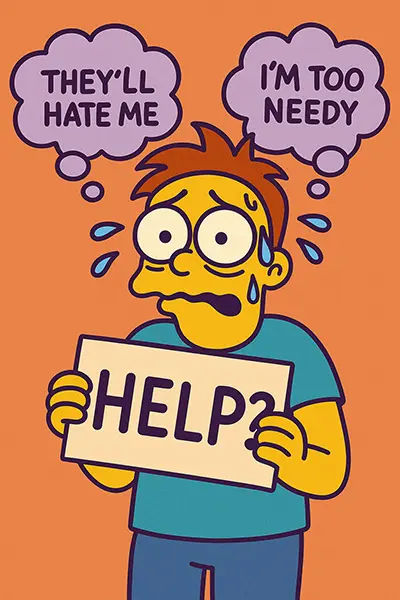
Defining the Core Belief of “I Am a Burden”
At its heart, this fear stems from a core belief that you’re inherently troublesome or unworthy when you express needs. It’s like carrying around this invisible backpack stuffed with old stories maybe from times when your asks were met with sighs or eye rolls. I remember back in college, I was struggling with a tough class and finally mustered up to ask a prof for extra time on an assignment. His response? A curt “Everyone’s busy, deal with it.” Boom, that reinforced the idea that my needs were a hassle.

Over time, that belief digs in deep, making every potential ask feel like you’re imposing on someone’s precious time or energy. But here’s the thing: it’s often more about our inner critic than reality. Psychologists call this a distorted self-view, where we overestimate how much we’re “burdening” others kinda like assuming everyone’s as judgy as that one voice in your head.
Why Do Some People Feel Like Burdens When They Ask for Help?
Asking for help can feel like walking a tightrope over a pit of rejection, especially if you’ve been burned before. For some, it’s rooted in cultural stuff like how society praises independence as the ultimate virtue, making reliance seem weak. Others might tie it to personal history; think about growing up in a home where emotions were dismissed as “drama,” so now reaching out equals vulnerability overload. And let’s not ignore how this hits harder for folks in marginalized groups, like the LGBT+ community, where asking for support might mean risking judgment or invalidation on top of everything else.
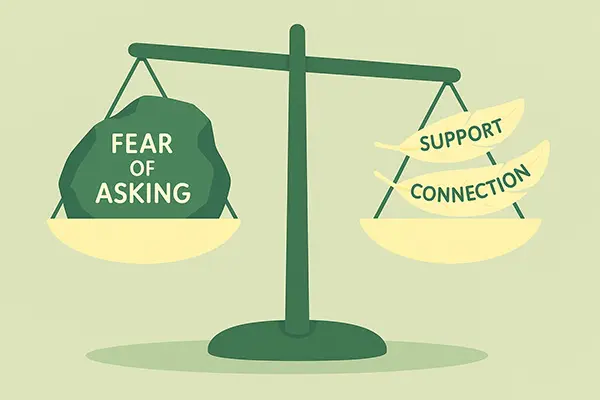
I know a friend who’s queer and hesitated for months to ask their family for emotional backing during a rough patch feared it’d confirm some stereotype of being “too much.” The shame piles on, turning a simple “Hey, can you listen?” into a full-blown internal debate. But overcoming that starts with seeing it’s not about being flawed; it’s about rewiring how we view help as a two-way street, not a debt.
Signs and Symptoms of Burden Anxiety
You might not even realize burden anxiety is creeping in until it’s messing with your days like when you’d rather suffer silently than speak up. It shows up in sneaky ways, both in how you act and how you feel inside. Spotting these early can be a game-changer, helping you shift from isolation to gentle outreach without the guilt trip.
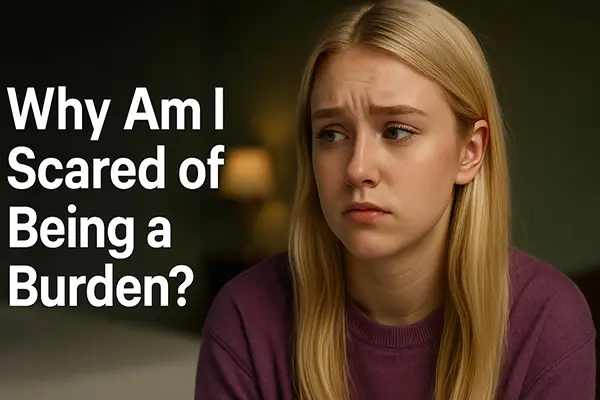
Common Patterns Like Downplaying Struggles or Isolating
One big red flag is constantly minimizing your own stuff: “Oh, it’s no big deal, I’ll figure it out.” Sound familiar? I did this for years, brushing off burnout at work because I didn’t wanna “complain” to my team. Or isolating pulling away from friends when life’s heavy, thinking you’re sparing them the trouble.
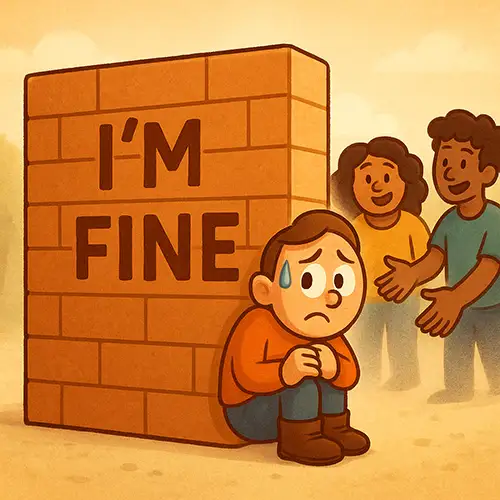
It’s like building walls to protect others, but really, you’re just locking yourself in. Other patterns? Over-apologizing for every little ask, or going overboard to “earn” help by doing favors first. These habits keep the cycle going, making asking feel even scarier over time. Breaking this starts with small, safe reaches like texting a pal about a bad day without downplaying it.
Emotional and Physical Indicators
Emotionally, it’s that knot in your stomach before asking, or waves of shame after. Physically? Tense shoulders, headaches from overthinking, or even avoiding eye contact in convos. I once felt my heart race just thinking about asking my roommate for a ride ridiculous, right?
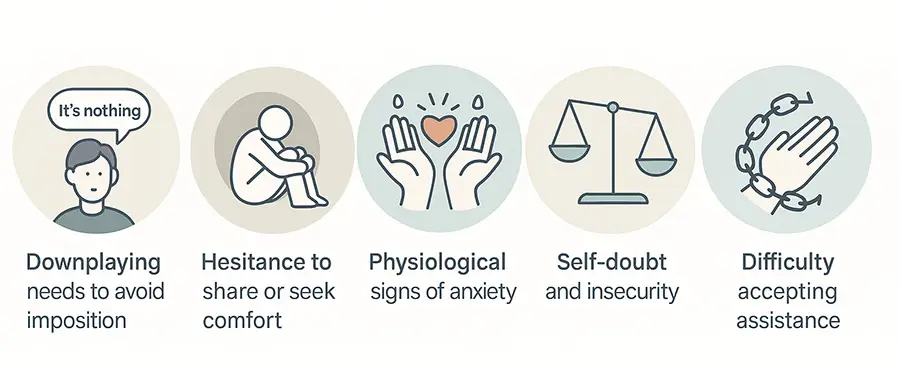
But that’s the body screaming what the mind won’t say. Fatigue hits too, from carrying everything solo. If you’re in the LGBT+ space, this might amp up with fears of being seen as “needy” in communities where resilience is prized. Watch for these: constant self-doubt, procrastination on needs, or even resentment toward others who ask freely. It’s exhausting, but recognizing it is the first step to ditching the shame.
Causes and Roots of This Fear
Digging into why this fear grips us so tight often leads back to early life stuff those subtle (or not-so-subtle) messages that shaped how we see our worth. It’s not random; it’s layered, from family dynamics to broader psych factors. Understanding these roots can soften the self-blame, making it easier to challenge the “burden” narrative when asking for help.
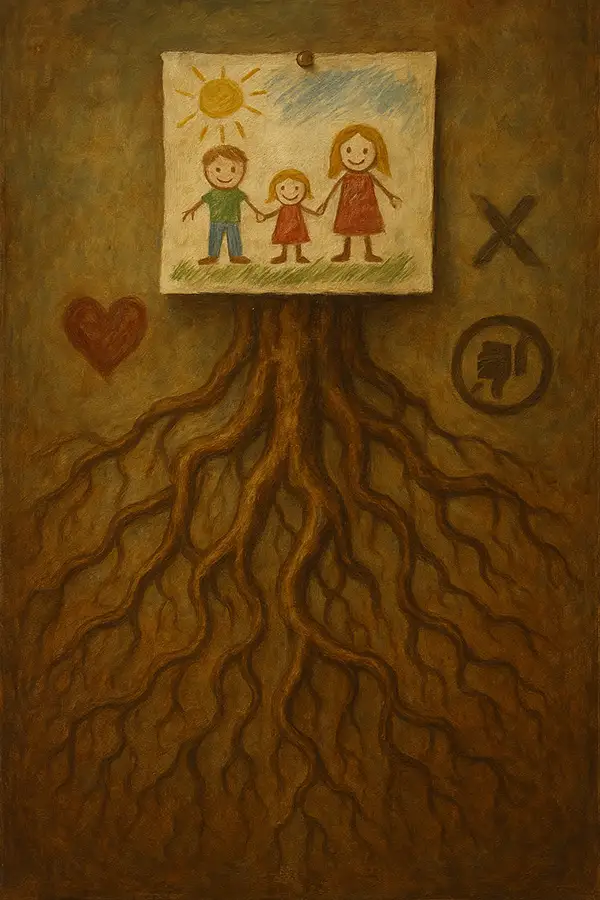
Childhood Messaging and Trauma Responses
A lot of this starts young maybe parents who said “Don’t be a bother” or modeled self-sacrifice without complaint. I grew up hearing “Handle it yourself” from my folks, which turned into me avoiding asks like the plague. Trauma amps it up; if rejection or abandonment was a thing, your brain wires help-seeking as risky.

It’s a survival response: better alone than hurt. For some in the LGBT+ world, this might stem from invalidating environments where expressing needs led to dismissal or worse. Healing involves reframing: help isn’t weakness; it’s human. External read: Check Verywell Mind on abandonment fears.
Perfectionism and Caregiving Roles
Perfectionists often fear burdening because anything less than flawless feels like failure asking means admitting imperfection. If you were the family caregiver, always giving but never taking, that role sticks. My sister was like that, always the “strong one,” until burnout hit. It creates this imbalance where your needs feel secondary. Overcoming? Practice small asks to build proof that people don’t mind. Link to our piece on mental self-care for regaining focus.
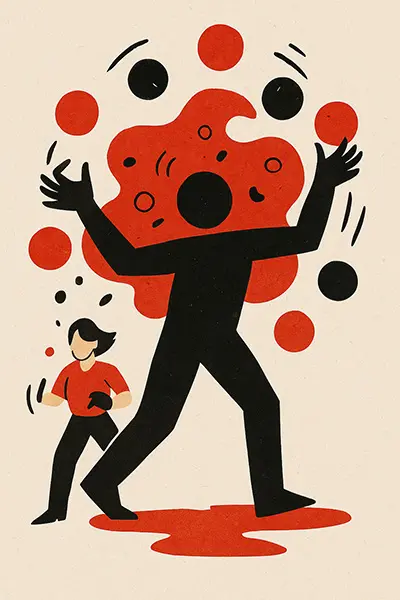
Psychological Factors Like Fear of Rejection
Deep down, it’s often tied to rejection sensitivity worrying one ask could shatter a bond. Psych terms like attachment styles play in; anxious types fear abandonment, avoidants fear dependency. It’s evolutionary too, from tribal days where being a “burden” meant exclusion. But modern life twists it. To overcome, exposure helps: start with low-stakes asks. Solid external: APA on fear of rejection.
| Fear Type | Description | Key Difference from Burden Fear | Related Article |
|---|---|---|---|
| Burden Fear | Worry that asking for help makes you troublesome or unworthy | Focuses on interpersonal imposition and shame in vulnerability | N/A |
| People-Pleasing | Prioritizing others’ needs over your own to avoid conflict | More about approval-seeking than fear of needing support | Relationships & People Pleasing |
| Imposter Syndrome | Feeling like a fraud, fearing exposure | Centers on competence doubts, not relational burdens | Check our growth guides |
| Codependency | Over-reliance on relationships for self-worth | Involves giving too much, but burden fear is about receiving | Explore emotional boundaries |
Comparison to Similar Emotional Struggles
This burden fear isn’t isolated it overlaps with other emotional tangles but stands out in its focus on help-asking shame. Comparing helps clarify why it feels unique, paving the way to targeted overcoming without mixing it up with broader anxieties.
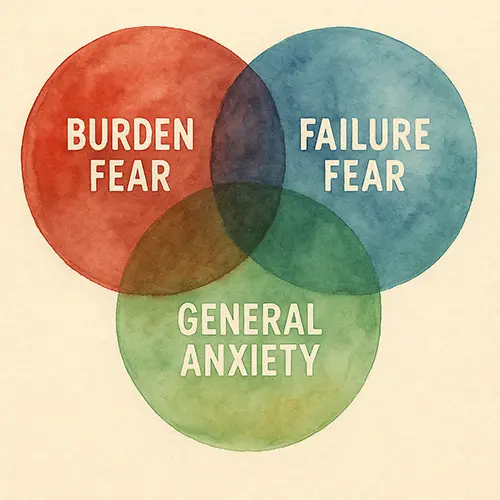
How It Differs from Fear of Failure or General Anxiety
Fear of failure is about bombing tasks, like dreading a presentation flop, while burden fear zeros in on relational fallout from needing backup it’s more “What if they resent me?” than “What if I suck?” General anxiety is a constant buzz of worry, but this one’s triggered by vulnerability moments. I felt general anxiety daily, but burden stuff spiked only when asking arose. Diff: Failure fear pushes perfection; burden fear isolates. Overcoming? Reframe asks as strength, not flaw. For more, see knowing yourself for self-care. External: Positive Psychology on failure fear.
Stages of Overcoming the Fear
Okay, so you’ve spotted that nagging fear of being a burden, right? Now comes the part where we roll up our sleeves and start chipping away at it. Overcoming this isn’t some overnight miracle it’s more like peeling an onion, layer by layer, with a few tears along the way. But hey, each step builds on the last, turning that shame around asking for help into something that feels… normal. Almost empowering. We’ll break it down into stages that make sense, starting from digging up those old stories to slowly letting support in without the guilt trip.

Recognizing and Naming the Root Story
First off, you gotta shine a light on where this fear even comes from. It’s like finding that one tangled knot in a ball of yarn that messes up everything. For me, it traced back to middle school when I asked my dad for help with homework and he snapped, “Figure it out, life’s not gonna hand you answers.” Ouch. That stuck, making me think my needs were always an imposition.
Start by journaling grab a notebook and write out moments when asking felt wrong. Name it: “This is my ‘burden story’ from that time.” Psychologists say labeling reduces the power, kinda like calling a monster by its name makes it less scary. And if you’re in the LGBT+ community, this might hit different maybe from times when reaching out meant risking invalidation of your identity, adding extra layers of hesitation. Give yourself grace here; it’s not about blame, just understanding.

I remember sitting in a quiet cafe, rain tapping on the window like impatient fingers, scribbling these old memories. It felt messy, but afterward, the fear didn’t loom as large. Try it during a low-pressure time, maybe with a warm tea nearby. External nudge: Check this piece from Psychology Today on why asking feels hard. It backs up how naming shifts things.
Building Capacity for Receiving Support
Once you’ve named it, it’s time to build up your “receiving muscles” you know, that ability to let help in without freaking out. Start small, like accepting a compliment without deflecting. “Thanks, that means a lot” instead of “Oh, it’s nothing.” I practiced this with my barista buddy who always offers an extra shot in my coffee; saying yes felt weird at first, but it built trust in myself. Think of it as exposure therapy lite gradually upping the stakes to bigger asks, like borrowing a book from a friend.
From a neuroscience angle, this rewires your brain’s response. The amygdala, that fear center, calms down with repeated safe experiences, while oxytocin the “bonding hormone” kicks in, making connections feel rewarding not risky. Studies show consistent small vulnerabilities lower cortisol levels over time, easing that chronic tension. It’s science saying you’re not stuck; your brain can adapt.

For folks navigating LGBT+ spaces, building this might mean finding affirming groups where support flows freely, without the extra weight of judgment. Link to our chat on mental self-care that helped regain focus it’s got tips on boundaries that tie right in.
Practical Tools and Exercises
Alright, let’s get hands-on. These tools aren’t magic pills, but they’re like that trusty Swiss army knife for your emotional toolkit. We’ll cover how to phrase asks without the burden vibe, calm your jitters, and flip the script on what help really means. Practice ’em bit by bit, and you’ll notice the shame starting to fade.
How to Ask for Help Without Feeling Like a Burden
Asking doesn’t have to feel like dropping a bomb. Try scripting it simple: “Hey, I’m swamped with this report could you glance over it for five minutes? No pressure if not.” See? Specific, time-bound, and gives an out. I used this when I was overwhelmed moving apartments; texted a pal, “Need a hand with boxes Saturday? Pizza on me.” It worked, and no one rolled their eyes. The key’s in owning your ask without over-apologizing ditch the “sorry to bother you” opener.

Common snag: “But what if they say no?” That’s okay! It’s not rejection of you, just their bandwidth. Reframe it as info, not failure. For more on this, peep Stanford’s take on how people wanna help more than we think. 😊
Soothing Techniques for Your Nervous System
When that knot in your gut tightens before asking, hit pause with some body-based tricks. Deep belly breathing: In for four, hold four, out for six. I do this in my car, windows cracked, feeling the cool air brush my face it grounds me quick. Or try progressive muscle tense-and-release; clench your fists hard, then let go, imagining the fear draining away.
Another fave: bilateral stimulation, like tapping alternte shoulders borrowed from EMDR therapy, it calms the nervous system by mimicking REM sleep patterns. Neuro-wise, this engages the parasympathetic response, dropping adrenaline and boosting vagal tone for that chill vibe. Super helpful if anxiety spikes high. If you’re LGBT+ and this fear ties to past traumas, these can be gentle entry points before deeper work.
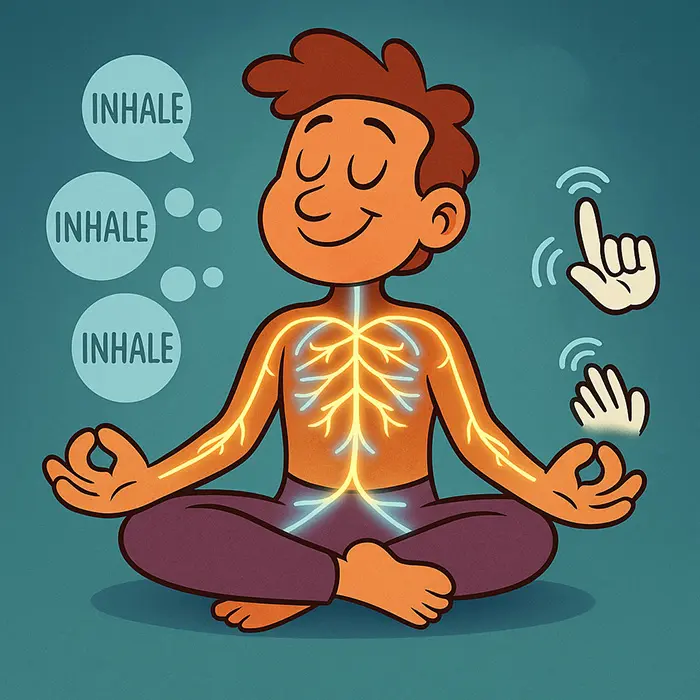
Reframing Help as Mutual Connection
Shift your mindset: Help isn’t a one-way debt; it’s the glue in real relationships. Remember, you’ve probably helped others without resenting ’em why assume they would? I reframed by listing times I enjoyed supporting friends, like listening to my cousin vent about her job. It hit me: Giving feels good, so receiving lets others feel that too.
Exercise: Write a “help exchange journal.” Note asks you make and how it strengthens bonds. Over time, it builds proof against the burden lie. Tie this to our post on knowing yourself as the first self-care step self-awareness amps this up. “It’s like trading stories around a campfire; everyone warms up,” a therapist once told me. 🔥
- Daily Micro-Ask: Start with something tiny, like “Can you pass the salt?” Build to emotional shares.
- Gratitude Pause: After receiving help, jot one positive feeling no overthinking.
- Boundary Check: Ask yourself, “Is this mutual?” Skip one-sided drains.
- Role-Play Practice: Mirror chat: Rehearse asks aloud, note body feels.
- Weekly Reflection: End week reviewing one successful ask what shifted?
Real-Life Scenarios and Case Studies
Seeing this fear play out in everyday stuff makes it less abstract. Let’s look at a couple stories ones that echo what many go through, from school struggles to deeper dips like depression. These aren’t just tales; they’re reminders you’re not alone in this.
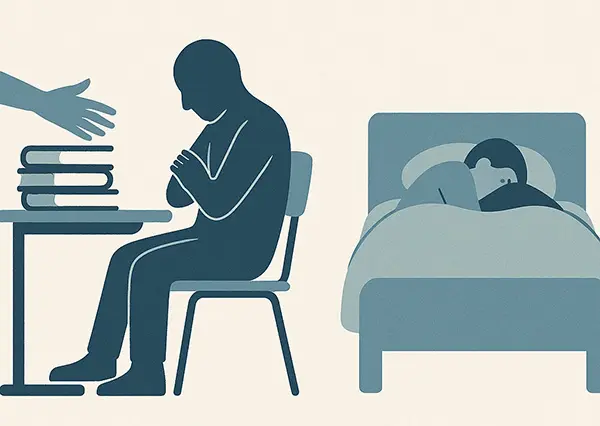
Stories of Difficulty Accepting Help in School or with Depression
Take Alex, a college kid I knew who bombed midterms but wouldn’t hit up study groups. “Didn’t wanna drag ’em down,” he said. Grew up with parents praising solo wins, so group help felt like cheating or worse, burdening. Ended up isolating, grades tanking until a prof noticed and gently pushed him toward tutoring. Turned out, the group loved sharing tips; it bonded ’em. Lesson? School’s a team sport, not a solo marathon.
Then there’s Mia, battling depression last winter. She’d stare at her phone, wanting to text friends, but thought, “They’re busy with their lives.” Classic burden trap. Finally, after a teary night hearing the hum of her fridge in the empty kitchen, she reached out to one. That convo led to therapy referrals. Depression amps the fear brain chemistry makes vulnerability feel like danger. But asking cracked the door to healing. For more emotional layers, see our dive into why emotions feel too much. Real talk: It’s okay to need a hand up. 💪
Warning Signs and When to Seek Professional Help
Sometimes this fear creeps beyond DIY fixes watch for when it turns chronic, messing with your life big time. Knowing when to call in pros can be a lifesaver, literally.

Indicators Like Chronic Isolation or Escalating Shame
If you’re ghosting social stuff regularly, or that shame after asking spirals into self-loathing days on end, red flag. Physical stuff too: Constant exhaustion from solo-carrying everything, or anxiety attacks pre-ask. I hit this wall once avoided help so long, ended up with burnout headaches that wouldn’t quit.
Escalating shame can lead to deeper isolation, even thoughts of worthlessness don’t ignore if it’s worsening. Other signs: Resentment building toward others who seem “easy” with help, or avoiding needs till crisis hits. If it’s tying to trauma or identity struggles in LGBT+ circles, pros trained in that can unpack safely.
External resource: Verywell Mind on abandonment fears linking to this. Time to seek help when DIY isn’t cutting it therapists via apps like BetterHelp make it low-key.
🟨
Red Flags Box:
- Chronic avoidance of social support, leading to loneliness spikes.
- Shame turning into self-harm thoughts or deep depression.
- Physical symptoms like insomnia from overthinking burdens.
- Escalating anxiety that disrupts work/school.
Steps to Reach Out:
- Search “therapist near me specializing in anxiety” or use sites like Psychology Today.
- Start with a hotline if urgent e.g., 988 in US for mental health.
- Tell a trusted person: “I’m struggling with this fear any recs?”
- Book that first session; it’s okay to shop around for fit.
Research, Studies, and Statistics
You know, digging into the science behind this fear of being a burden kinda feels like flipping on a light in a dark room it makes everything less scary and more manageable. I’ve always been curious about why my brain twists needing help into some kinda personal fail, and turns out, psych research has some solid answers. We’ll poke at terms like “self-perceived burden” and how bottling up needs messes with your head, backed by studies that hit close to home. For me, reading this stuff was like that quiet moment in a library, smell of old books grounding you, realizing you’re not alone in the struggle.

Insights from Psychology on Burden Phobia and Related Terms
So, psychologists often call this “self-perceived burden” or sometimes “fear of being a burden,” which ties right into bigger stuff like depression and anxiety. One study I came across showed anxiety actually predicts this fear more than depression does, which surprised me cause I always linked it to feeling low.
✨ Last updated on 25.08.2025
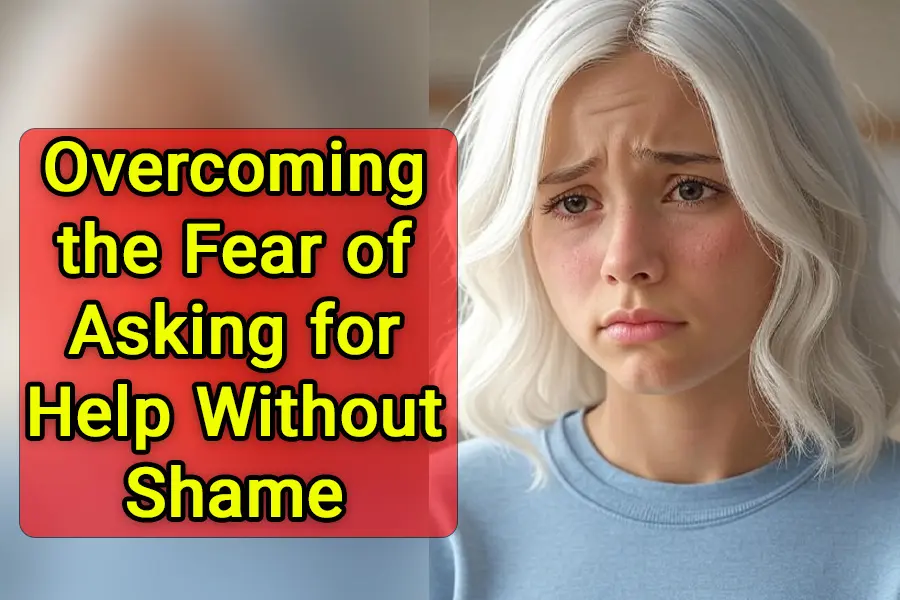
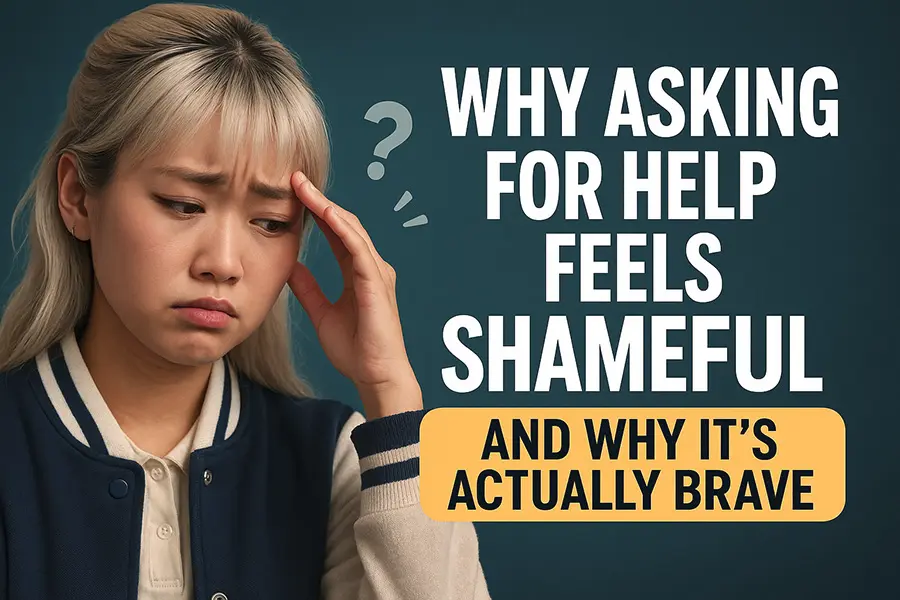
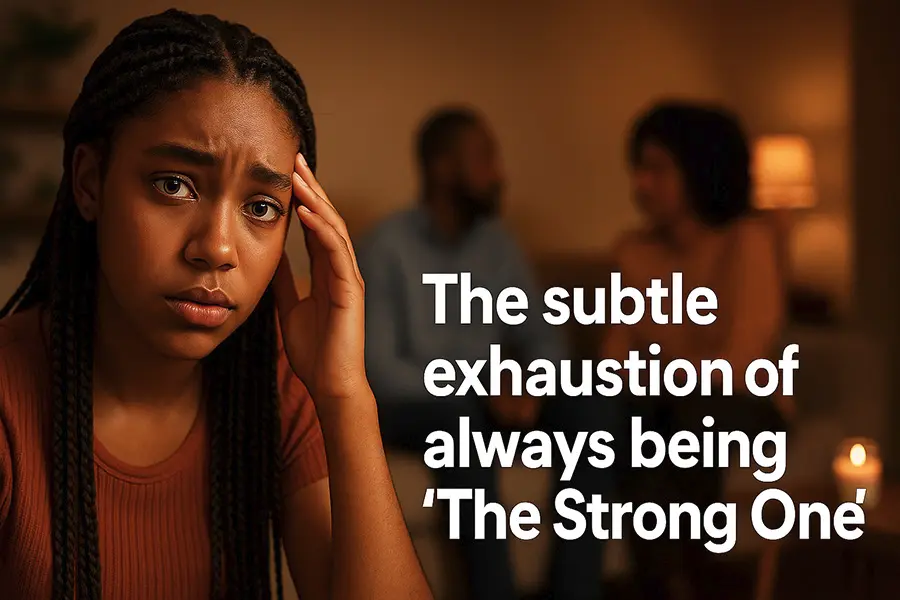










Leave a Reply